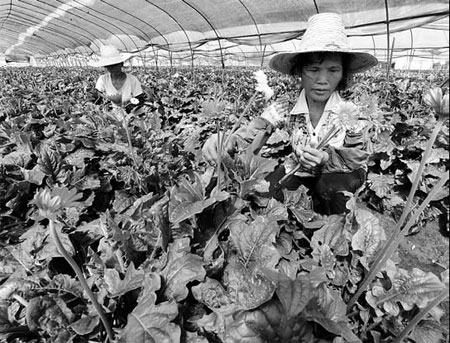Taiwan farmers eye bigger market share on mainland
Updated: 2011-11-08 08:00
By Chen Xin and Hu Meidong (China Daily)
|
|||||||||
|
Peasants pick flowers in a greenhouse in Qingliu Development Park for Taiwan Farmers in Fujian province in a file photo. Zhang Guojun / Xinhua |
SANMING, Fujian - Taiwan farmers who set up businesses at a development park in Qingliu county in East China's Fujian province are eyeing a bigger market on the mainland. They hope that the local government helps address their financing problems.
Qingliu Development Park for Taiwan Farmers was set up in 2006 and is among the six parks of its kind in Fujian. The parks aim to attract Taiwan farmers to bring investment, agricultural varieties, as well as technological and managerial skills, besides helping them explore the market on the mainland and boosting cross-Straits cooperation in the agricultural field, local officials said.
There are 29 such parks on the mainland.
"The soil and climate in Fujian are quite similar to those in Taiwan, and it's suitable for growing Taiwan vegetables such as cabbage, balsam pear and okra," said Tang Thin-then who hails from Taiwan's Taichung and has invested around 20 million yuan ($3.15 million) to grow vegetables in the development park in Qingliu last year.
Local government laid out many favorable policies to attract Taiwan farmers and help their businesses grow.
"We would waive their land use fees in the first two years and let them enjoy a 30 percent discount in electricity price," said Lai Wensheng, deputy head of the park's management committee and deputy director of Qingliu agricultural bureau.
The park will also improve infrastructure and provide free facilities to Taiwan farmers, said Lai.
A total of 53 Taiwan-invested agricultural companies and 12 individual agricultural families operate in the park, running businesses such as growing flowers, fruits and vegetables, fisheries and processing of agricultural products.
"The park grows products worth around 960 million yuan each year and those businesses help provide jobs for nearly 9,000 people in the county," said Lai.
Tang Thin-then said his vegetables were popular in the market and that he planned to expand his business next year. But it was not easy getting a bank loan since vegetables were perishable commodities and hence could not be mortgaged.
Wu Chia-cheng, a farmer from Pingtung in Taiwan who grows tomatoes on a 40,000-square-meters land in the park, had the same problem.
"I want to switch to soilless tomato planting, but I need a loan of around 500,000 yuan to do that. I hope the government could help facilitate the funds," he said.
In fact, the local government is trying to find ways to address the problem.
Lai said they were considering setting up a credit system within the development park and a company that will act as a guarantor to help promising companies and farmers acquire loans.
Lured by the favorable policies, another Taiwan company signed a deal with the park on Sunday, agreeing to invest $50 million to develop ecological agriculture and biopharmaceutical industry there.
China Daily
(China Daily 11/08/2011 page4)












